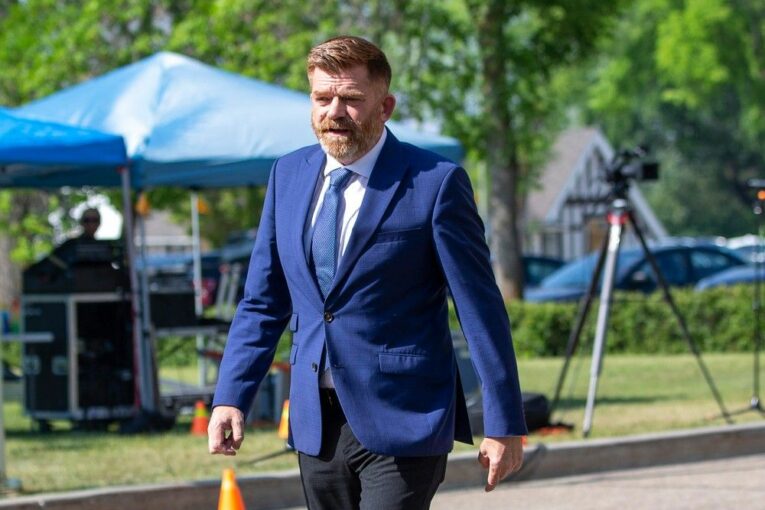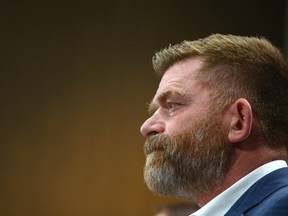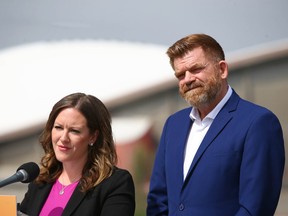
Alberta’s new energy minister calls Fort McMurray home, the first time that’s happened since the oilsands region catapulted the province into becoming a global energy powerhouse.
With oilsands production averaging 3.2 million barrels per day — exceeding many OPEC counties — Fort McMurray is the “beating heart” of Alberta’s oil and gas sector, according to one former energy minister.
On Friday, Brian Jean, the MLA for Fort McMurray-Lac La Biche, took over the critical energy portfolio as the province — and the oilsands — face complex challenges surrounding decarbonization and a looming showdown with Ottawa over its incoming emissions cap on the country’s oil and gas sector.
“I have lived the ups and downs in the oilsands industry first-hand and, in Fort McMurray, we get a lot of it,” Jean said in an interview Friday.
“When you come from Fort McMurray, you understand both the good and the bad . . . that oil is one of those commodities with those ups and downs, and we have to make sure we plan accordingly.”
Jean, 60, previously served as the minister of jobs, economy and northern development in the UCP government. He also represented the federal constituency of Fort McMurray-Athabasca as a Conservative MP from 2004 until 2014.
“There’s not a lot of training for Brian Jean in the file,” said former energy and environment minister Sonya Savage.
“He understands the issues, he’s lived in the middle of them, and he has been for many years.”

Yet, there will be no shortage of heavy lifting for the UCP government on energy concerns. These include how to best reduce emissions from the oil and gas sector — it’s the largest source of industrial emissions in the country — and reach an agreement with industry and Ottawa over incentives available to new carbon capture, utilization and storage (CCUS) developments.
Mammoth multibillion-dollar investments will be needed in the coming years on CCUS projects, as well as to expand the petrochemical and hydrogen sectors.
The portfolio is now called energy and minerals, reflecting the emerging potential of critical minerals that are needed in the energy transition, such as lithium and cobalt.
And, there’s another battle shaping up between the province and the Trudeau government over energy policies.
“I think Ottawa is definitely the No. 1 challenge we have going forward. They’ve continuously, and have for decades, interfered and threatened our jurisdictional rights,” Jean said.
“I don’t see that as being something that can’t be overcome. We can sit down and have mature adult conversations about what’s best for the people of Alberta, and what’s best for the people of Canada.”
Upon winning last month’s provincial election, Smith warned a “big fight” is coming with Ottawa over its plans for the oil and gas emissions cap, which she says will effectively become a production cap for the province, infringing on its constitutional rights.
Alberta is also awaiting new federal rules around plans for a net-zero power grid by 2035, which could drive up costs for consumers and industry.
“Brian Jean is going to be in the eye of the storm,” said Rick Orman, who served as energy minister in the Getty government.
“Jean has the type of personality to be tough as nails. But I also think he understands Ottawa and the reality of Ottawa.”

A lawyer by training, Jean comes to the portfolio with a boatload of political experience, which could prove helpful in the upcoming discussions with Ottawa. After serving as a federal MP, he moved into the provincial arena last decade, becoming leader of the Wildrose party.
He twice ran unsuccessfully to lead the merged UCP party, and was appointed to the provincial cabinet last October.
The federal emissions cap will likely be the top issue in the coming months for the new energy minister, said Savage.
“The next move is up to Ottawa,” she said. “If they start moving aggressively on the emissions cap and the clean electricity regulations, I think that would provoke a reaction from Alberta.”
Yet, energy experts say Alberta must be open to reaching a deal with the federal government when it comes to co-ordinating incentives for CCUS, as it could trigger several energy projects to move forward, creating thousands of jobs.
If it enables the oilsands to move toward net-zero emissions, it should also allow operators to increase production in the future.
“There are wins to be had,” said Marla Orenstein, director of the Natural Resources Centre at the Canada West Foundation.
Striking a deal on CCUS would help decarbonize many other industrial sectors, including power generation, petrochemicals, cement manufacturing, and conventional oil and gas production.
With a federal investment tax credit for CCUS projects already on the table, “2023 is an opportunity for a significant reset,” said Martha Hall Findlay, a former Liberal MP who later worked as Suncor Energy’s chief climate officer.
“These issues are bigger than one place. The oil and gas industry in Alberta is incredibly important for the entire country,” she said.
Recommended from Editorial
-

Braid: Smith slaps down questions about abortion rights as LaGrange gets health job
-

Calgary MLAs land prominent roles in Smith’s cabinet
-

More cost cutting likely as oil and gas companies seek efficiencies: industry experts
-

Varcoe: Alberta keeps leading Canada in renewable investment, while oil growth continues
Dealing with other concerns, including how to get more aging wells cleaned up and manage tailings ponds in the oilsands, should also be high on the agenda in the coming years.
And the energy minister will be in the middle of it all.
“It’s a position of immense influence, but immense importance . . . if you’re faced with choppy waters and have a tough time, people notice,” said former energy minister Ken Hughes.
“The minister of energy is essentially the trustee-in-chief for the third-largest oil reserves in the world. That is a pretty important role for the people of Alberta.”
Chris Varcoe is a Calgary Herald columnist.
You can read more of the news on source
